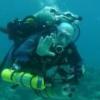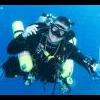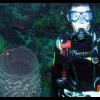I just read the following article from Leisure Pro. I was wondering how many of you have actually had Nitrogen Narcosis?? We all joke about it and laugh about it, but it can be very serious. I've never experienced it myself. Can anyone that has tell us about your experience?? We may all learn something.
Here is the article:
All SCUBA divers should be aware throughout their training that nitrogen narcosis is an uncommon but very real threat. Its intoxicating effects can seriously impair a diver’s judgment underwater and lead them into dangerous situations; in rare cases it can even lead to coma or death. Although prevention is usually the best medicine, knowing how to treat this condition is vital for every diver to know in order to have a safe and memorable experience in the water.
As we learned in last week’s post, nitrogen narcosis is caused by breathing nitrogen under pressure while underwater. The nitrogen remains dissolved in a diver’s blood and tissues and does not form bubbles, which can block blood flow to certain parts of the body. The deeper into water a diver moves, the greater the pressure which is applied to the nitrogen, and the stronger the symptoms will be felt. Divers can start to experience the symptoms of nitrogen narcosis at depths of around 100 feet, though symptoms can become more intense up to 130 feet below the surface. For this reason, a depth of 130 feet is considered the recommended “cutoff” for use of regular air.
The symptoms of nitrogen narcosis can be very similar to the effects of consuming too much alcohol. A diver may experience poor judgment, decreased coordination and motor skills, and a light-headed or detached feeling. They may even hallucinate. Very prolonged exposure to deep depths can lead to a coma or the diver’s death.
Fortunately, treatment for nitrogen narcosis can be enacted while still on the dive. Typically it involves the diver simply ascending to a shallower depth at a safe rate, then taking a moment for their body to readjust to the change in pressure. In most cases this will cause the symptoms to subside and eventually disappear. If the diver feels well enough after this and can relate that to their buddy, they can continue the dive, but should not return to the depths they reached when their symptoms began.


















